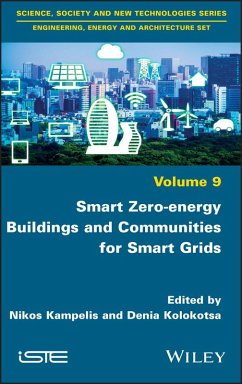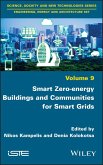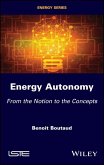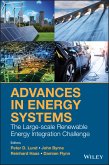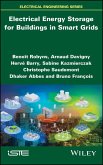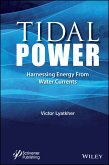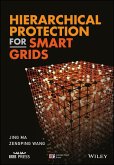Smart Zero-energy Buildings and Communities for Smart Grids (eBook, PDF)
Redaktion: Kampelis, Nikos; Kolokotsa, Denia


Alle Infos zum eBook verschenken

Smart Zero-energy Buildings and Communities for Smart Grids (eBook, PDF)
Redaktion: Kampelis, Nikos; Kolokotsa, Denia
- Format: PDF
- Merkliste
- Auf die Merkliste
- Bewerten Bewerten
- Teilen
- Produkt teilen
- Produkterinnerung
- Produkterinnerung

Hier können Sie sich einloggen

Bitte loggen Sie sich zunächst in Ihr Kundenkonto ein oder registrieren Sie sich bei bücher.de, um das eBook-Abo tolino select nutzen zu können.
Smart zero-energy buildings and communities have a major role to play in the evolution of the electric grid towards alignment with carbon neutrality policies. The goal to reduce greenhouse gas emissions in the built environment can be pursued through a holistic approach, including the drastic reduction of buildings' energy consumption. The state-of-the-art in this field relates, on the one hand, to design methodologies and innovative technologies which aim to minimize the energy demand at the building level. On the other hand, the development of information and communication technologies,…mehr
- Geräte: PC
- mit Kopierschutz
- eBook Hilfe
- Größe: 46.25MB
![Smart Zero-energy Buildings and Communities for Smart Grids (eBook, ePUB) Smart Zero-energy Buildings and Communities for Smart Grids (eBook, ePUB)]() Smart Zero-energy Buildings and Communities for Smart Grids (eBook, ePUB)139,99 €
Smart Zero-energy Buildings and Communities for Smart Grids (eBook, ePUB)139,99 €![Energy Autonomy (eBook, PDF) Energy Autonomy (eBook, PDF)]() Benoit BoutaudEnergy Autonomy (eBook, PDF)126,99 €
Benoit BoutaudEnergy Autonomy (eBook, PDF)126,99 €![Handbook of Biomass Valorization for Industrial Applications (eBook, PDF) Handbook of Biomass Valorization for Industrial Applications (eBook, PDF)]() Handbook of Biomass Valorization for Industrial Applications (eBook, PDF)210,99 €
Handbook of Biomass Valorization for Industrial Applications (eBook, PDF)210,99 €![Advances in Energy Systems (eBook, PDF) Advances in Energy Systems (eBook, PDF)]() Advances in Energy Systems (eBook, PDF)167,99 €
Advances in Energy Systems (eBook, PDF)167,99 €![Electrical Energy Storage for Buildings in Smart Grids (eBook, PDF) Electrical Energy Storage for Buildings in Smart Grids (eBook, PDF)]() Benoit RobynsElectrical Energy Storage for Buildings in Smart Grids (eBook, PDF)139,99 €
Benoit RobynsElectrical Energy Storage for Buildings in Smart Grids (eBook, PDF)139,99 €![Tidal Power (eBook, PDF) Tidal Power (eBook, PDF)]() Victor M. LyatkherTidal Power (eBook, PDF)177,99 €
Victor M. LyatkherTidal Power (eBook, PDF)177,99 €![Hierarchical Protection for Smart Grids (eBook, PDF) Hierarchical Protection for Smart Grids (eBook, PDF)]() Jing MaHierarchical Protection for Smart Grids (eBook, PDF)123,99 €
Jing MaHierarchical Protection for Smart Grids (eBook, PDF)123,99 €-
-
-
Dieser Download kann aus rechtlichen Gründen nur mit Rechnungsadresse in A, B, BG, CY, CZ, D, DK, EW, E, FIN, F, GR, HR, H, IRL, I, LT, L, LR, M, NL, PL, P, R, S, SLO, SK ausgeliefert werden.
- Produktdetails
- Verlag: John Wiley & Sons
- Seitenzahl: 320
- Erscheinungstermin: 11. Februar 2022
- Englisch
- ISBN-13: 9781119902188
- Artikelnr.: 63511111
- Verlag: John Wiley & Sons
- Seitenzahl: 320
- Erscheinungstermin: 11. Februar 2022
- Englisch
- ISBN-13: 9781119902188
- Artikelnr.: 63511111
Nikos KAMPELIS
List of Acronyms xv
Nikos KAMPELIS
Chapter 1 The Role of Smart Grids in the Building Sector 1
Denia KOLOKOTSA
1.1 Smart and zero-energy buildings 2
1.1.1 Smart metering 3
1.1.2 Demand response (DR) 4
1.1.3 Distributed systems 6
1.2 Smart and zero-energy communities 6
1.3 Conclusion and future prospects 10
Chapter 2 Integrated Design (ID) Towards Smart Zero-energy Buildings and Smart Grids 13
Theoni KARLESSI, Pietro MURATORE, Luca VENEZIA, Laura STANDARDI, Klemens LEUTGÖB and Anne Sigrid NORDBY
2.1 Introduction 15
2.2 Methodology 16
2.3 Integrated design in smart and zero-energy buildings 17
2.4 ID process principles and guidelines 19
2.4.1 Benefits 22
2.4.2 Barriers 23
2.5 Scope of services 24
2.6 Remuneration models 26
2.7 Application of evaluation tools 28
2.8 Sustainability certification 29
2.9 Consultancy and quality assurance 30
2.10 Measurement of design quality criteria 31
2.11 Defining a client's objectives 33
2.11.1 Capital cost reduction 34
2.11.2 Delivery risk reduction 35
2.12 Defining the tenant's objectives 35
2.12.1 Operational cost reduction 36
2.12.2 Building unsuitability risk reduction 36
2.13 Best practice sites 37
2.13.1 Alexandros N Tombazis and Associates Architects S.A office building 37
2.13.2 APIVITA Commercial and Industrial S.A 42
2.13.3 Stavros Niarchos Foundation Cultural Center 46
2.13.4 Karelas Office Park 50
Chapter 3 Data Analysis and Energy Modeling in Smart and Zero-energy Buildings and Communities 55
Nikos KAMPELIS, Konstantinos GOBAKIS, Vagias VAGIAS, Denia KOLOKOTSA, Laura STANDARDI, Daniela ISIDORI, Cristina CRISTALLI, Fabio Maria MONTAGNINO, Filippo PAREDES, Pietro MURATORE, Luca VENEZIA, Marina Kyprianou DRACOU, Alaric MONTENON, Andri PYRGOU, Theoni KARLESSI and Mat SANTAMOURIS
3.1 Energy signature for the NTL of Cyprus Institute 55
3.2 Athalassa Campus and the NTL building 57
3.2.1 Methodology 61
3.2.2 Description of the Novel Technology case study 63
3.2.3 Data exploration 68
3.2.4 Correlation matrix 71
3.2.5 Regression model 72
3.3 Linear Fresnel solar collector at the NTL building, Cyprus Institute 85
3.3.1 Development of the NTL model 90
3.3.2 Energy performance analysis in the NTL 92
3.3.3 Discussion 100
3.4 Conclusion 101
Chapter 4 On the Comparison of Occupancy in Relation to Energy Consumption and Indoor Environmental Quality: A Case Study 103
Margarita Niki ASSIMAKOPOULOS, Nikolaos BARMPARESOS, Alexandros PANTAZARAS, Theoni KARLESSI and Siew Eang LEE
4.1 Introduction 103
4.2 Methodology 104
4.3 Description of the case building 105
4.4 Description of the experimental procedure 105
4.5 Results 106
4.5.1 Investigation of energy consumption and indoor air quality 106
4.5.2 Days of special interest - high occupancy 110
4.5.3 Days of special interest - increased energy consumption 112
4.6 Discussion and concluding remarks 112
Chapter 5 Indoor Environmental Quality and Energy Consumption Assessment and ANN Predictions for an Integrated Internet-based Energy Management System Towards a Zero-energy Building 115
Denia KOLOKOTSA
5.1 Introduction 115
5.2 Description of the SDE buildings 116
5.2.1 General information 116
5.2.2 Monitoring activities for SDE 3 118
5.
Nikos KAMPELIS
List of Acronyms xv
Nikos KAMPELIS
Chapter 1 The Role of Smart Grids in the Building Sector 1
Denia KOLOKOTSA
1.1 Smart and zero-energy buildings 2
1.1.1 Smart metering 3
1.1.2 Demand response (DR) 4
1.1.3 Distributed systems 6
1.2 Smart and zero-energy communities 6
1.3 Conclusion and future prospects 10
Chapter 2 Integrated Design (ID) Towards Smart Zero-energy Buildings and Smart Grids 13
Theoni KARLESSI, Pietro MURATORE, Luca VENEZIA, Laura STANDARDI, Klemens LEUTGÖB and Anne Sigrid NORDBY
2.1 Introduction 15
2.2 Methodology 16
2.3 Integrated design in smart and zero-energy buildings 17
2.4 ID process principles and guidelines 19
2.4.1 Benefits 22
2.4.2 Barriers 23
2.5 Scope of services 24
2.6 Remuneration models 26
2.7 Application of evaluation tools 28
2.8 Sustainability certification 29
2.9 Consultancy and quality assurance 30
2.10 Measurement of design quality criteria 31
2.11 Defining a client's objectives 33
2.11.1 Capital cost reduction 34
2.11.2 Delivery risk reduction 35
2.12 Defining the tenant's objectives 35
2.12.1 Operational cost reduction 36
2.12.2 Building unsuitability risk reduction 36
2.13 Best practice sites 37
2.13.1 Alexandros N Tombazis and Associates Architects S.A office building 37
2.13.2 APIVITA Commercial and Industrial S.A 42
2.13.3 Stavros Niarchos Foundation Cultural Center 46
2.13.4 Karelas Office Park 50
Chapter 3 Data Analysis and Energy Modeling in Smart and Zero-energy Buildings and Communities 55
Nikos KAMPELIS, Konstantinos GOBAKIS, Vagias VAGIAS, Denia KOLOKOTSA, Laura STANDARDI, Daniela ISIDORI, Cristina CRISTALLI, Fabio Maria MONTAGNINO, Filippo PAREDES, Pietro MURATORE, Luca VENEZIA, Marina Kyprianou DRACOU, Alaric MONTENON, Andri PYRGOU, Theoni KARLESSI and Mat SANTAMOURIS
3.1 Energy signature for the NTL of Cyprus Institute 55
3.2 Athalassa Campus and the NTL building 57
3.2.1 Methodology 61
3.2.2 Description of the Novel Technology case study 63
3.2.3 Data exploration 68
3.2.4 Correlation matrix 71
3.2.5 Regression model 72
3.3 Linear Fresnel solar collector at the NTL building, Cyprus Institute 85
3.3.1 Development of the NTL model 90
3.3.2 Energy performance analysis in the NTL 92
3.3.3 Discussion 100
3.4 Conclusion 101
Chapter 4 On the Comparison of Occupancy in Relation to Energy Consumption and Indoor Environmental Quality: A Case Study 103
Margarita Niki ASSIMAKOPOULOS, Nikolaos BARMPARESOS, Alexandros PANTAZARAS, Theoni KARLESSI and Siew Eang LEE
4.1 Introduction 103
4.2 Methodology 104
4.3 Description of the case building 105
4.4 Description of the experimental procedure 105
4.5 Results 106
4.5.1 Investigation of energy consumption and indoor air quality 106
4.5.2 Days of special interest - high occupancy 110
4.5.3 Days of special interest - increased energy consumption 112
4.6 Discussion and concluding remarks 112
Chapter 5 Indoor Environmental Quality and Energy Consumption Assessment and ANN Predictions for an Integrated Internet-based Energy Management System Towards a Zero-energy Building 115
Denia KOLOKOTSA
5.1 Introduction 115
5.2 Description of the SDE buildings 116
5.2.1 General information 116
5.2.2 Monitoring activities for SDE 3 118
5.
